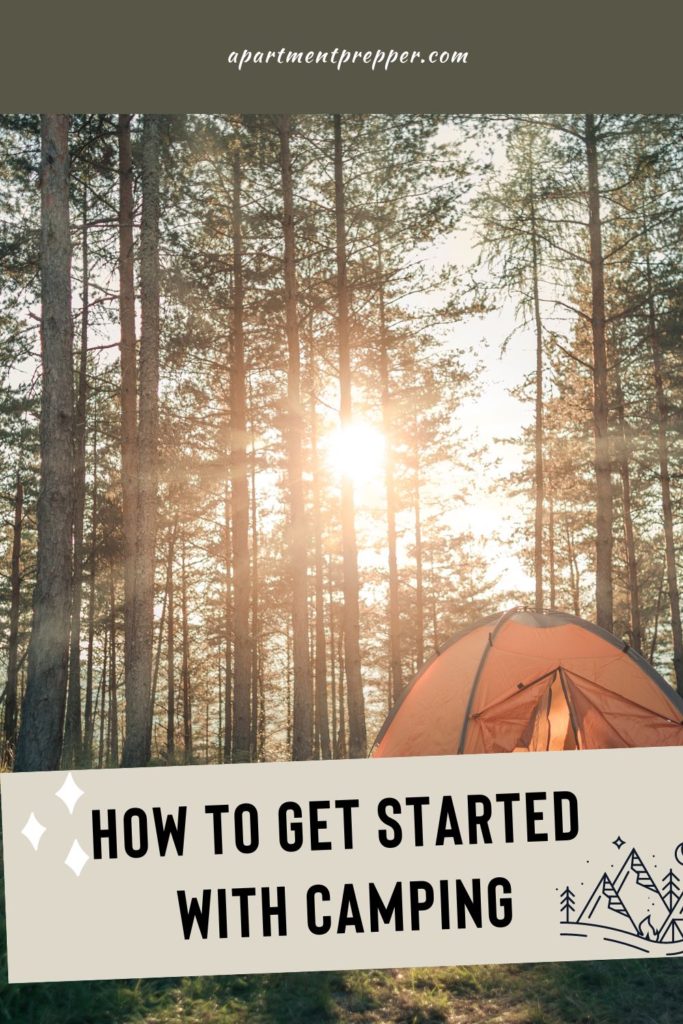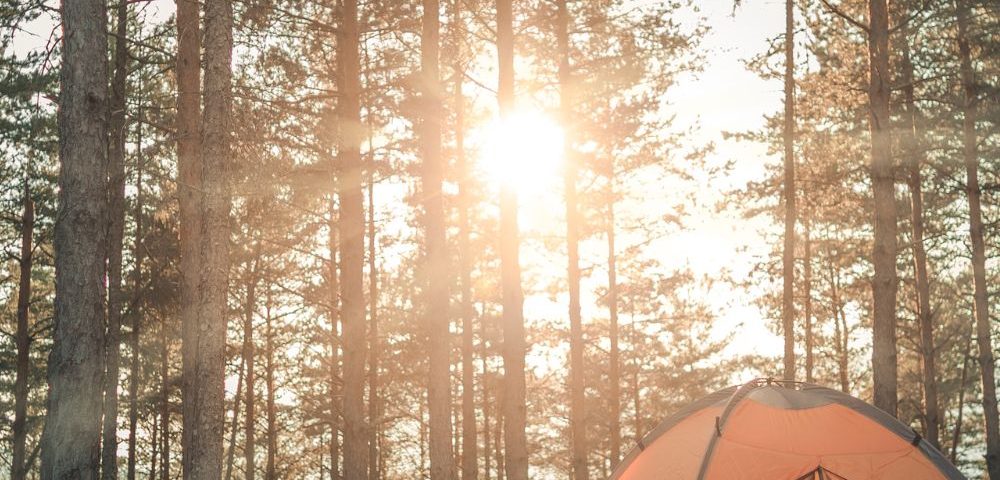Written by Bernie Carr
Summer season is here and one of the great summer activities is camping out in nature. Camping is a great way to connect with nature and take a break from technology. Spending time in nature has been shown to reduce stress, improve mood, and enhance overall well-being. Although there is an initial expense for obtaining gear, camping can be a fairly inexpensive pursuit.
Why try camping?
Camping offers numerous benefits for both physical and mental well-being.
- Connect with nature. Camping allows you to immerse yourself in the natural environment, providing a break from the concrete jungle and daily routines.
- Get some fresh air and become more active. Camping often involves activities like hiking, swimming, fishing, or simply exploring the surroundings. Engaging in outdoor activities promotes physical fitness, increases cardiovascular health, boosts energy levels, and improves sleep quality.
- Lower your stress. Being in natural surroundings and away from the pressures of everyday life can have a calming effect on the mind. The serene atmosphere of camping promotes relaxation, reduces stress levels, and allows for a break from technology and constant connectivity.
- Improve your sleep. Sleeping outdoors can help regulate your body’s natural sleep-wake cycle. Exposure to natural light during the day and darkness at night can improve the quality of sleep, leading to more restful nights and increased energy levels during the day.
- Get some social interaction. Camping often involves spending time with friends, family, or fellow campers. It provides an opportunity to strengthen relationships and create lasting memories by chatting around the campfire, cooking meals together, or engaging in outdoor activities as a group.
- Learn to be more mindful. Camping encourages mindfulness and being present in the moment. Without the distractions of technology and daily responsibilities, you can focus on the sights, sounds, and sensations of nature. This can promote relaxation, improve mental clarity, and enhance self-awareness.
- Learn some skills. Camping offers opportunities to learn and develop new skills. Learn to set up a tent, start a campfire, cook meals outdoors, navigate through trails, learn how to tell how much daylight is left, or identify plants and wildlife. Acquiring these skills not only enhances your camping experience but also provides practical survival knowledge.
- Appreciate the environment. Spending time in nature fosters a sense of appreciation and respect for the environment. By experiencing the beauty and serenity of natural surroundings firsthand, you may develop a deeper connection with nature and a desire to protect and preserve it for future generations.
- It’s fun! Camping allows you to explore new places, discover hidden gems, and embark on outdoor adventures. Whether it’s hiking to a breathtaking viewpoint, discovering a hidden waterfall, or stargazing under a clear night sky, camping opens doors to new experiences and the thrill of exploration.
How to get started with camping
If you’re new to camping, here are some steps to help you get started:
- Research and choose a camping destination: Decide where you want to go camping. Look for national parks, state parks, campgrounds, or other outdoor areas near your location. Consider factors like accessibility, amenities, activities, and the type of environment you prefer (mountains, forests, lakes, etc.).
- Plan your trip: Determine the duration of your camping trip, whether it’s a weekend getaway or a longer adventure. Check the weather forecast for your chosen dates and pack accordingly. Make a list of essential camping gear and supplies you’ll need for a comfortable experience (more on this below).
- Gather camping equipment: Invest in or borrow the necessary camping gear. Essential items include a tent, sleeping bags or air mattresses, camping stove or grill, cooking utensils, coolers or ice chests, lantern or flashlight, camping chairs, and a first aid kit. Depending on your needs and the activities you plan, you may also want to bring hiking gear, fishing equipment, or other outdoor gear.
- Set up your campsite: Once you arrive at your chosen camping spot, find a suitable area to set up your tent. Look for a level and clear spot away from hazards like dead trees or rocky terrain. Follow the instructions provided with your tent to set it up correctly. Arrange your camping gear inside the tent and set up a cooking area, a campfire ring (if permitted), and a designated area for relaxation.
- Follow camping etiquette and safety guidelines: Familiarize yourself with the rules and regulations of the campground or outdoor area you’re visiting. Respect quiet hours, keep your campsite clean, and properly dispose of trash. Follow any fire safety guidelines and never leave a fire unattended. Be mindful of wildlife and never feed or approach wild animals.
- Enjoy outdoor activities: Camping offers a range of activities depending on your preferences and the location. You can go hiking, fishing, swimming, canoeing, bird-watching, stargazing, or simply relax and enjoy the tranquility of nature. Check if there are any guided tours or ranger programs available at your campground or nearby attractions.
- Prepare meals and stay hydrated: Plan your meals ahead and bring non-perishable food items that are easy to prepare. Pack snacks and plenty of water to stay hydrated during your camping trip. If there are no potable water sources at the campsite, make sure to bring enough water for drinking, cooking, and cleaning.
- Be prepared for emergencies: Carry a first aid kit with essential medical supplies. Inform someone about your camping plans, including the location and duration of your trip. Familiarize yourself with emergency procedures and know the nearest hospital or medical facilities.
- Leave no trace: Practice Leave No Trace principles, which means leaving the campsite as you found it. Pack out all trash, dispose of waste properly, and minimize your impact on the environment. Respect nature and ensure future campers can enjoy the same experience.
Tips for success
Practice using your gear
Before heading out, take out your gear and try it out. Read the directions to make sure you have everything you need. If you have a new camping stove, check to make sure you have fuel such as propane, as required by the stove. Try setting up your tent in the backyard or living room before your trip. It would make your stay that much easier and smoother.
Consider your family’s needs
Does anyone in the family get car sick? Make sure you bring the remedies required. If you are bringing pets, don’t forget their pet dish, food, and water.
Map out your route
GPS may not work in some areas, so make sure you print out your maps and get familiar with the route ahead of time.
Research the facilities
If you or your family are new to camping, try “roughing it” gradually. Find out if your camp site has access to drinkable water. I would also recommend a campsite that has restrooms, so no one has to dig a hole when nature calls.
Remember, camping is about enjoying the outdoors and disconnecting from the routine and stresses of daily life. Embrace the adventure, be prepared, and have fun exploring the beauty of nature!
Today’s societal climate not supportive of prepping. With your help, we can keep bringing you content that is often suppressed. Help keep Apartment Prepper alive.
Join me on Patreon for ad-free content.
Or Help out via Paypal
About the author
Bernie Carr is the founder of Apartment Prepper. She has written several books including the best-selling Prepper’s Pocket Guide, Jake and Miller’s Big Adventure, The Penny-Pinching Prepper and How to Prepare for Most Emergencies on a $50 a Month Budget. Bernie’s latest e-book, FRUGAL DIY has just been released on Amazon. Her work appears in sites such as the Allstate Blog and Clark.com, as well as print magazines such as Backwoods Survival Guide and Prepper Survival Guide. She has been featured in national publications such as Fox Business and Popular Mechanics. Learn more about Bernie here.
FB: https://www.facebook.com/apartmentprepper
Instagram: https://www.instagram.com/apartmentpreppers/
Twitter: https://twitter.com/AptPrepper
YouTube: https://www.youtube.com/channel/UC7vOtdbo-wiBeBxD6puCr1Q
Pinterest: https://www.pinterest.com/aptprepper/





